Here’s a look back at past winners and the books that made that year’s shortlist. You’ll also find our Jury from each award season.
2020 Winner
WINNER
The Machinery of Government: Public Administration and the Liberal State by Joseph Heath (Oxford University Press)
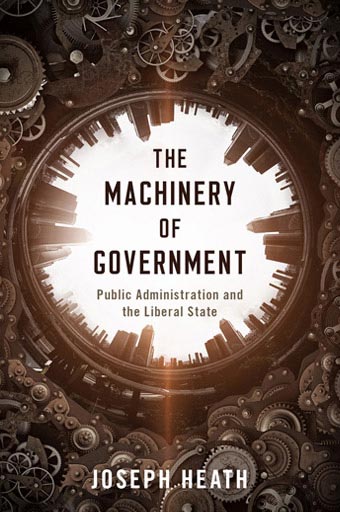
The “machinery of government” – i.e., the activities of the public service as agents of elected representatives – constitutes the largest “industry” in every modern society. It is the direct means by which government performs (or fails) on behalf of the citizenry. In The Machinery of Government, Heath sets out the fundamental arguments on what constitutes good governance. He emphasizes three basic principles – equality, efficiency, liberty – as well as tools such as cost-benefit analysis and the Pareto Principle in developing and executing policy. Heath points out how much power lies in the hands of the permanent public service, and by dissecting potential for and limitations of this power, he contributes to a greater understanding of the role of the public administrators. He addresses both the theoretical and philosophical basis for effective public administration, including ethical and moral issues.
Joseph Heath is Professor in the Department of Philosophy and the Munk School of Global Affairs and Public Policy at the University of Toronto. Heath is the author of several books, including Enlightenment 2.0, which was shortlisted for the 2014 Donner Prize and won the Shaughnessy Cohen prize for Political Writing.
RUNNERS-UP
Sécurité, liberté et criminalité, by Maurice Cusson (Les éditions du Septentrion)
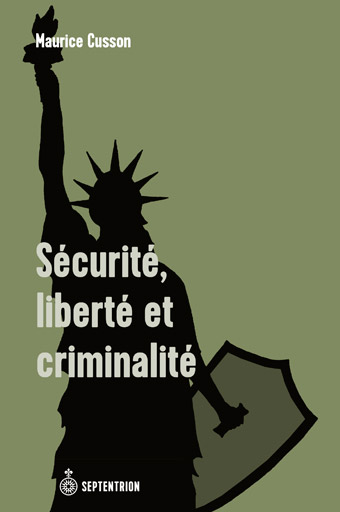
Cusson’s overview of the principles involved in maintaining physical security of the person without infringing on the rights of individuals should be required reading for every politician and journalist in Canada. This issue is fundamental in the governance of a liberal democratic state. Given recent surges in aggressive behavior (January 6th in the US, “gilet jaunes” in France), the need to strike the right balance between freedom and security in the world of BLM and Defund the Police is critical. He skillfully blends historical analysis with contemporary data to support his policy recommendations. He includes important discussions on the need for first-rate training for police, and also the knotty issue of using military for domestic policing. Clear, concise, and timely, this book is a valuable contribution to the discussion of the basic trade-off between security and liberty.
Maurice Cusson is a criminologist, writer and professor emeritus. He received the Governor General’s Award for his book Le Contrôle social du crime . He is a fellow of the Royal Society of Canada.
RESET: Reclaiming the Internet for Civil Society by Ronald J. Deibert (House of Anansi Press)
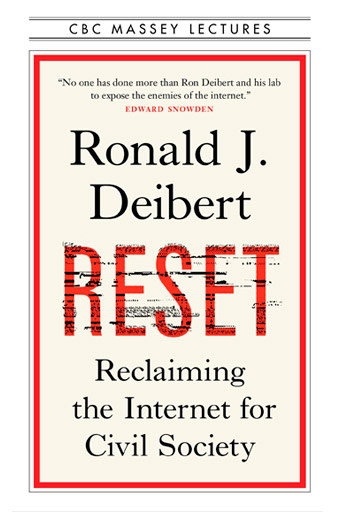
As a society and a democracy, we are slowly becoming aware of the power, use and more importantly misuse of our digital data. The need for government to grapple with the oversight of this space is clear. Currently, in Canada, it is of pressing importance. In RESET, an exceptionally well-written and accessible book, Deibert draws upon many real-life and startling examples (GlaxoSmithKlein’s investment in 23andMe). The information and issues, while complex, are effectively synthesized. Despite the promise the internet holds for the future of civilization, Deibert explains the forces that have undermined the nobler purposes and suggests policy to correct these malign forces. The book is compelling, clear and provides a solid case for action on the part of government. And RESET will make many Canadians more thoughtful about how they use their cellphones.
Ronald J. Deibert is professor of Political Science and director of the Citizen Lab at the Munk School of Global Affairs and Public Policy, University of Toronto. Deibert is the author of Black Code: Surveillance, Privacy, and the Dark Side of the Internet.
The Citizen’s Guide to Climate Success: Overcoming Myths that Hinder Progress by Mark Jaccard (Cambridge University Press)
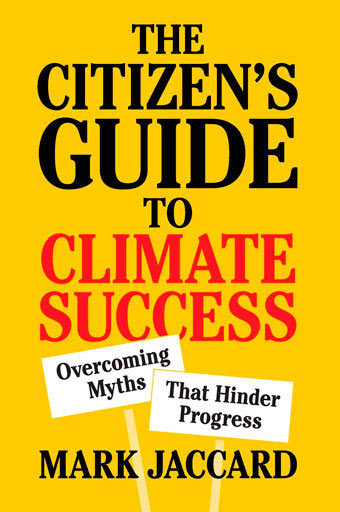
The issues of climate change/disruption and the development of new and innovative approaches to address them, are fundamental to our collective future. With a clear explanation of complex issues, Jaccard aims to encourage greater citizen understanding and support – a prerequisite for serious political commitment. He makes a key, and surprisingly controversial, argument – political “do-ability” is essential in any climate change policy. A crucial lesson for economists, social idealists, and techno-optimists is that insisting on perfection guarantees failure. Jaccard’s recommendations are pitched at two levels. For governments he has clear and practical recommendations (domestic electricity and transportation). As the title suggests, much of his advice is to citizens on how to distinguish real progress from lip service. This is a wise, clear, most comprehensive but also pragmatic treatment of current thought on climate change and how to move forward to mitigate it.
Mark Jaccard is a professor of sustainable energy at Simon Fraser University in BC. He has helped many governments with climate-energy policy. He is a member of the Royal Society of Canada and his earlier book, Sustainable Fossil Fuels won the Donner Prize.
The Age of Fentanyl: Ending the Opioid Epidemic by Brodie Ramin, M.D. (Dundurn Press)
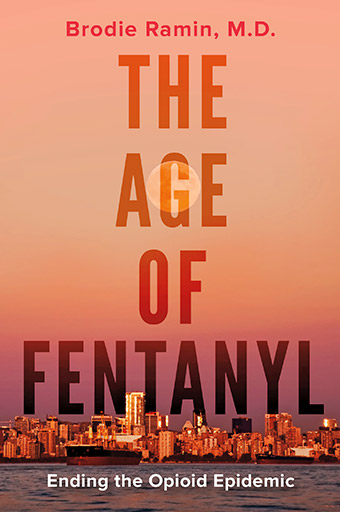
The opioid epidemic is real, growing, and in many parts of Canada is killing more people than COVID. In his empathetic presentation of the personal causes of addiction and an excellent survey of potential policy measures to deal with supply and treatment, Ramin makes a real contribution to the understanding of the issues and the enormous challenges (legal, ethical, political) involved in resolving the crisis. The Age of Fentanyl is especially strong in describing the evolution of the opioid epidemic and discusses “treatments” from both medical and social viewpoints. He is particularly successful in making the medical explanations accessible and juxtaposing those with policy recommendations. His personal experience on the front lines, and combination of individual stories with the rationale for some potentially difficult policy recommendations (i.e., de-criminalization, safe drug use centres) make the book recommended reading for police, physicians, social service providers, and everyone involved in drug and addiction policy.
Brodie Ramin, M.D. is a primary care and addictions physician in Ottawa. He is an assistant professor at the University of Ottawa, and a Diplomate of the American Boar of Addiction Medicine.
2020 DONNER JURY
David A. Dodge
CHAIR
David A. Dodge, O.C., F.R.S.C., is the Chair of the Donner Prize jury. A former Governor of the Bank of Canada from 2001 to 2008 and Chancellor of Queen’s University from 2008 to 2015, David Dodge is currently Senior Advisor at Bennett Jones LLP, chair of the National Council of the C.D. Howe Institute, and member of the boards of CIFAR and CCA. During his government career, Dr. Dodge has been the G7 Deputy Minister of Finance and Deputy Minister of Health. During his academic career, he taught economics at Queen’s University; at the School of Advanced International Studies, Johns Hopkins University; at the Faculty of Commerce at the University of British Columbia; and at Simon Fraser University.
Dr. Mark S. Dockstator
Dr. Mark S. Dockstator is past president of the First Nations University of Canada and currently a professor at the Chaney Wenjack School of Indigenous Studies, Trent University and Director of the Indigenous Knowledge Initiative at Queen’s University. A member of the Oneida Nation of the Thames, he has served as Chair of the First Nations Statistical institute and held senior positions with the Alaska to Alberta Railway, Assembly of Manitoba Chiefs, the Rama Economic Development Corporation, the Royal Commission on Aboriginal Peoples and the Indian Land Claims Commission. Dr. Dockstator currently serves on a variety of Boards, including the Canadian Institutes of Health Research, Rideau Hall Foundation, Royal Military College, Teach for Canada, Goodman School of Business Advisory Committee/ Brock University and the Canadian Museum of Nature Foundation.
Jean-Marie Dufour
Jean-Marie Dufour, O.C., O.Q., is the William Dow Professor of Economics at McGill University, and Fellow of the Econometric Society, the American Statistical Association, the International Association for Applied Econometrics, the Canadian Economics Association (CEA), and the Royal Society of Canada. He is also the Director of the Canadian Econometric Study Group, and Research Fellow at CIRANO and CIREQ. Dr. Dufour has served as President of the CEA. He has also held a Bank of Canada Research Fellowship, a Canada Research Chair (Econometrics, Université de Montréal), the Pierre-de-Fermat Chair of Excellence (Toulouse School of Economics), the Banco Santander Chair of Excellence (Madrid), and has received numerous prizes, including the Killam and Léon-Gérin Prizes for Social Sciences, the John Rae Prize (CEA), a Guggenheim Fellowship, and the Konrad Adenauer Research Award (Germany).
Brenda Eaton
Brenda Eaton is a director serving on corporate, not-for-profit, private and crown corporation boards. Currently Transelec Chair, she is also a member of the Boards of FortisBC, Westland Insurance, Technical Safety BC and the Core Area sewage treatment project board. Prior to becoming a corporate director, Ms. Eaton was Deputy Minister to the Premier of British Columbia, as well as Deputy Minister of Finance and Treasury Board; Energy and Mines; and Social Services. For several years she was Chief Financial Officer at a Health Authority. Ms. Eaton is also active in the not-for-profit sector including Alzheimer’s Society of B.C., Vancouver Foundation, Triathlon Canada and Max Bell Foundation. Ms. Eaton has a Master’s Degree in Economics. She has received several recognition awards including the Queen’s Jubilee Award for community contribution, University of Victoria’s Distinguished Alumni and WXN’s 100 Most Powerful Women in Canada.
Peter Nicholson
Peter Nicholson, O.C., has served in numerous posts in government, business, science and higher education. He was born in Halifax and studied physics at Dalhousie University, where he received bachelor’s and master’s degrees. He went on to get a Ph.D. in operations research at Stanford University and began his academic career by teaching computer science at the University of Minnesota. Dr. Nicholson was a member of the Nova Scotia Legislature and has served as Deputy Chief of Staff for Policy in the Office of the Prime Minister. He has also held senior executive positions with Scotiabank and BCE, was the Special Advisor to the Secretary-General of the Organization for Economic Co-operation and Development and was the inaugural Chief Executive Officer of the Council of Canadian Academies. He currently splits his time between Annapolis Royal, Nova Scotia, and Austin, Texas.
Glenda Yeates
Glenda Yeates is a public sector leader with 32 years of experience leading organizations in complex policy environments at both the national and provincial levels. Ms. Yeates has served as federal Deputy Minister of Health, President and CEO of the Canadian Institute for Health Information, and as the Deputy Minister of both the Departments of Health and Social Services within the Government of Saskatchewan. A member of the Order of Canada, the Alberta native serves on the boards of Alberta Health Services and Canadian Blood Services, and is a past board member of the Public Policy Forum, Carleton University and the Canadian Health Services Research Foundation.

